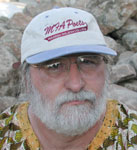Richard Gabriel
Sun Microsystems
|

|

Richard P. Gabriel received a PhD in Computer Science from Stanford University in 1981, and an MFA in Poetry from Warren Wilson College in 1998. He has been a researcher at Stanford University, company president and Chief Technical Officer at Lucid, Inc., vice president of Development at ParcPlace-Digtalk, a management consultant for several startups and Sun Microsystems, and Consulting Professor of Computer Science at Stanford University.
He helped design and implement a variety of dialects of Lisp. He is author of three books ("Performance and Evaluation of Lisp Systems," MIT Press, "Patterns of Software: Tales from the Software Community," Oxford University Press, and "Writers' Workshops and the Work of Making Things," Addison-Wesley Press), with two forthcoming in 2002-2003 ("Open for Business: How and Why a Company Should Participate in Open Source," (Morgan Kaufman), and "Leaf of my Puzzled Desire," (Dreamsongs Press)). He has published more than 100 scientific, technical, and semi-popular papers, articles, and essays on computing. He currently is a Distinguished Engineer and chief scientist of a small laboratory at Sun Microsystems, researching the architecture, design, and implementation of extraordinarily large systems as well as development techniques for building them. He is Sun's open source expert, advising the company on community-based strategies. He is also President of the Hillside Group, a nonprofit that nurtures the software patterns community by holding conferences, publishing books, and awarding scholarships. He is the lead guitarist in a working rock 'n' roll band and a poet.
|
|

Triggers and Practice
Monday 13:00 - 14:00 (Tutorial Room)
Developing software is like creative writing in more ways than many would believe. Both are creative activities, both involve working with others to improve results, and both improve with practice. I've had the opportunity to experience both a extensive computer science education and a deep creative writing education. My observation is that computing education practice could learn a lot from a fine-arts approach to learning. In this talk I invite you to see what creative writing and its education are like and how we could adapt the fine-arts approach to teaching programming. I will touch on how eXtreme Programming embraces (by coincidence) some fine-arts practices.
- Slides
The Road Not Taken
Monday 16:30 - 17:15 (Conference Hall)
ABSTRACT Two roads diverged in a yellow wood,
And sorry I could not travel both
And be one traveler, long I stood
And looked down one as far as I could
To where it bent in the undergrowth; Numerous computer researchers and practitioners believe we've come to a wood where two roads diverge: One road calls for us to continue as we have writing unreliable software using inappropriate languages, and debilitating methodologies under the rickety mathematical and engineering metaphors we developed in the 1960s or earlier, and the other begs us to find new metaphors and ways of approaching software to make system building safe, easier, and with respect for our humanity. IBM's Autonomic Computing, MIT's Amorphous Computing, the Feyerabend Project, the Biological Framings Workshop-all these are looking beyond current theories in ways reminiscent of Kuhn's paradigm shifts and Feyerabend's counterinduction. In this talk, Gabriel looks at the problems and proposed directions for the way less traveled: biology, physics, complexity science, and quantum computing, for example. I shall be telling this with a sigh
Somewhere ages and ages hence:
Two roads diverged in a wood, and I-
I took the one less traveled by,
And that has made all the difference.
- Slides
|